Fidelity, the largest U.S. 401(k) plan provider, said Tuesday that it will enable its participants to put a portion of their retirement funds into bitcoin – if their employers are willing to allow it.
The announcement could bring millions of people closer to investing directly in bitcoin this summer, without the need to set up accounts on cryptocurrency exchanges. But regulators have already said they’re skeptical of the idea. Last month, the Labor Department, which oversees workplace retirement plans, said it would cast a critical eye on plans that add digital assets to its investment menu.
Fidelity, which holds $2.4 trillion in 401(k) assets in 2020, or more than a third of the market, according to research firm Cerulli Associates, said it is launching a digital asset account to hold bitcoin. Account fees will range from 0.75% to 0.90% of assets, depending on several factors, including employer and the amount invested. The additional transaction fees, which have not been disclosed, will be “competitively priced,” the company said.
“We’re starting to hear more and more interest from plan sponsors about how bitcoin or digital assets can be offered in retirement plans,” Dave Gray, head of workplace retirement products and platforms at Fidelity Investments, said in an interview.
Business analytics firm MicroStrategy has signed on and Fidelity is in discussions with other employers, Mr. Gray said.
Daily Business Updates The latest stories on business, markets, and the economy, are delivered via email every business day. Get it delivered to your inbox.
Fidelity says the digital asset account will be widely available by mid-year. It will be integrated into the 401(k) investment menu, just like a more traditional mutual fund; for example, investors will have the option to put a percentage of their contributions into a bitcoin account. This percentage will be limited. Employers will determine the cap, but platforms are not allowed to allocate more than 20%, although this number may change.
More and more traditional investment options offering cryptocurrency investments have entered the market recently, including a series of exchange-traded funds last year. But Fidelity’s move is even more dramatic because it will let Americans use their sacred retirement funds to place bets in this emerging, highly volatile space.
The Labor Department didn’t go so far as to ban cryptocurrencies from retirement plans when it issued its compliance assistance document last month, but it reminded plan overseers – usually, employers, who must act solely in the best interests of participating workers – of their responsibility to choose “prudent” options. It strongly suggests that cryptocurrencies don’t seem to meet that standard.
“These investments present significant risks and challenges to participants’ retirement accounts, including significant risks of fraud, theft, and loss,” the department said in its compliance bulletin. It added that it will conduct an investigative program into plans that offer cryptocurrencies and related investments.
The agency said retired investors may misunderstand the risks of cryptocurrencies and raised concerns about valuation, custody, and record-keeping procedures.
In a letter to the Labor Department this month, Fidelity said the agency did not provide any guidance on how plan fiduciaries should address those concerns or fulfill their responsibilities when considering plan investments in cryptocurrencies. The company urged the department to work with plan overseers to develop steps to meet those obligations.
Mr. Gray said, “The Department of Labor is substituting its own opinions on cryptocurrencies for those that properly belong to plan sponsor fiduciaries.” Fidelity’s new account addresses many of the agency’s concerns, he said.
For example, Fidelity says digital accounts will be valued daily and held on its custodial platform to ensure “institutional-grade security” – and powerful educational materials are included in the offering.
But little can be done about Bitcoin’s volatility. After peaking near $69,000 on Nov. 9, it has been trading around $40,000 recently.
While Fidelity is known for its large retirement business, it was one of the earlier entrants into the cryptocurrency space. in 2018, it began offering trading and custody of digital assets for large institutional clients, and in 2020, it launched a private bitcoin fund for so-called accredited investors. Its Fidelity Advantage Bitcoin E.T.F. went public in Canada late last year.
Read More: Coinbase Is Launching NFT Marketplace in BETA 2022
Post time: 04-27-2022

